With a completely unique ecosystem of social networks and e-commerce platforms such as WeChat and Tmall, China can be a challenging ecosystem to launch your brand.
Choosing the right partner can be the most determining factor between success and failure. Here are some guidelines to pick the right company to launch your brand in China.
Overview of the Chinese Digital Ecosystem
The Chinese digital space is still dominated by two companies: Tencent and Alibaba. Tencent owns the messaging & social Apps WeChat and QQ, while Alibaba owns the payment App Alipay, the e-commerce App Taobao and the video platform Youku.
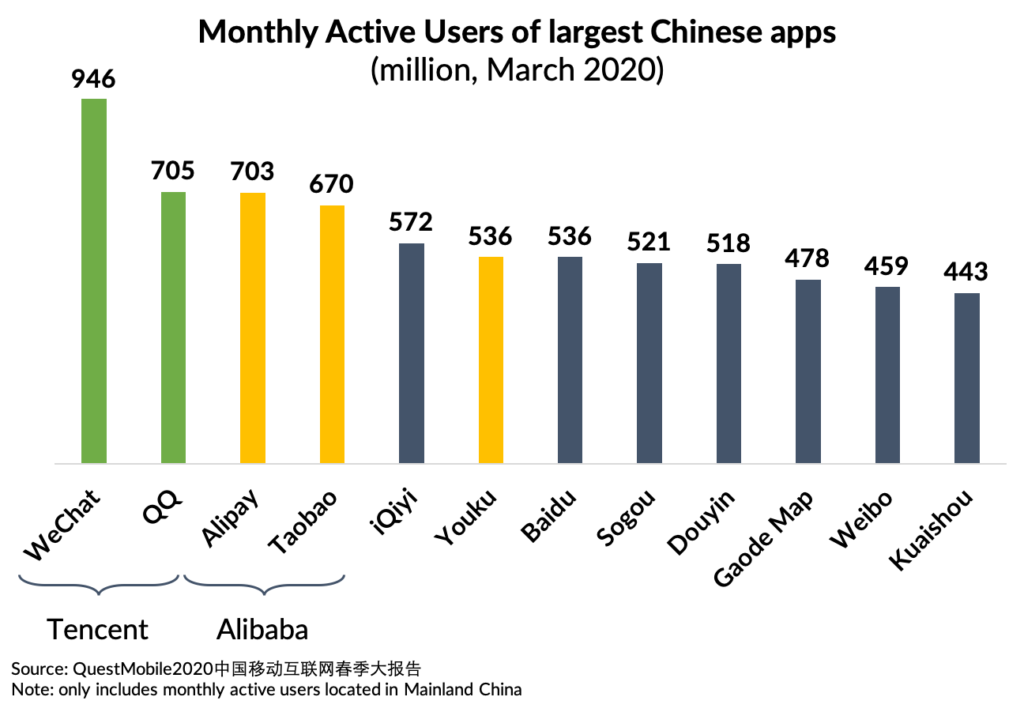
Most companies would, therefore, look first into launching on WeChat and Taobao (or its B2C equivalent Tmall) when getting started in China.
We will look into the best strategies to pick a partner for Tmall and WeChat.
Finding the right Tmall Partner (TP)
What is Tmall?
Tmall is the largest B2C e-commerce platform in China, owned by Alibaba. Alibaba recorded 711 million Annual Active Customers as of December 2019. During the 11th of November 2019 (Alibaba’s annual “Single’s Day” sales festival – the Chinese black Friday), the platform recorded 38.4 billion USD of sales within 24 hours.
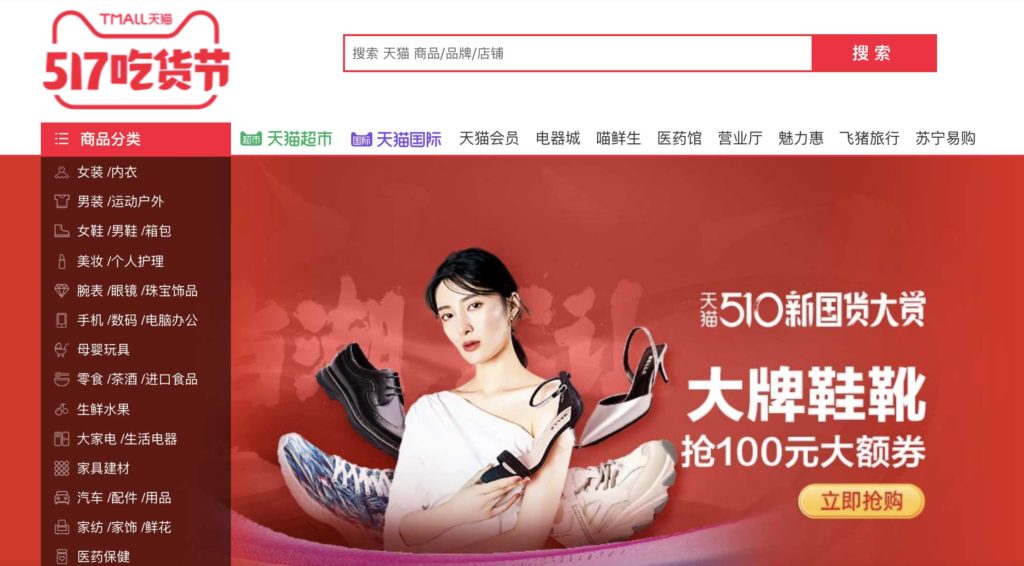
The home page of Tmall (12th of May 2020)
What is a Tmall Partner?
In order to operate on Tmall, brands are required to use the service of a Tmall Partner (especially so if they are selling cross-border through Tmall Global).
A Tmall Partner covers the following scope of work:
- Create an operation plan
- Execute store opening
- Decorate store & input product information
- Operate store on a daily basis: Product management, campaign planning, and execution
- Execute day-to-day marketing and promotions: Network promotions, daily consumer marketing, brand marketing
- Provide Customer Service to consumers
- Support logistic needs: Cross-border logistics,
warehouse services, courier services - Provide regular reports: Operations report and analysis
How to select a Tmall Partner (TP)?
There are several ways for your brand to select a Tmall partner:
- Look for a TP in the official list provided by Tmall: https://www.taobao.com/markets/promotion/tmgtp5?spm=a21bt.174184.908531.6.75c39b28BIJ2z1&wh_ttid=pc
- Get your current partner certified as a TP: https://www.taobao.com/markets/promotion/tmgtp3?spm=a21bt.174184.908531.4.5e499b28KvsBmW&wh_ttid=pc
- Reach out to Tmall directly. If your brand is pre-approved to sell on Tmall, Alibaba will reach out to relevant TP’s and will then introduce you to all Tmall Partners that will have expressed interest in your brand. You can contact Alibaba via the following email: bd_inquiries@alibaba-inc.com
How to assess the quality of a TP?
There are several ways to assess the quality of a Tmall Partner:
- TP sales: the best way to identify the quality of a TP is to check the performance of the clients they manage. Most TPs would have a list of clients on their website. Be careful though: large clients might use several TPs for different parts of their operations (customer service, product design, advertising, etc.). You can then use an online solution such as Dianchacha to get the total amount of sales from these specific stores.
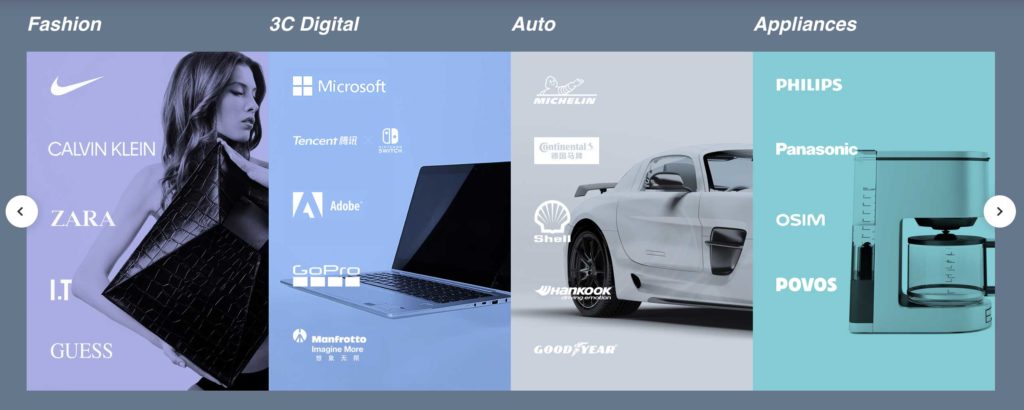
A list of clients from Baozun, one of the leading Chinese TPs
- TP rankings & industry focus: Tmall holds a record of the rankings of various TPs, along with the number of stores they’re operating in each industry. It is, of course, preferable to work with a TP with a strong focus in your specific industry.
- Public filings: some TPs such as Baozun became so large that they are now publicly listed. You can, therefore, find public filings including their revenue, growth, and information about their clients.
How much do Tmall Partners charge their clients?
Tmall partners usually charge three types of fees to their clients:
- Set-up fees
- Fixed monthly operating fees
- Commission
These fees might vary based on the client, the industry, the expected sales volume, and the TP.
Below is a table of fees quoted by 4 different Tmall Partners to the same client.
| Name | Commission | Set-up fee (USD) | Monthly fees (USD) |
| TP 1 | 10% | 21,000 | 23,000 |
| TP 2 | 7% | 8,500 | 8,500 |
| TP 3 | 10% | – | 10,000 |
| TP 4 | 5% | 18,000 | 25,000 |
Although pricing remains in the same ballpark, there are stark differences between TPs. Larger TPs tend to price higher, leveraging the synergies between their different clients as a selling point.
On top of these fees, clients should expect to spend around 25% of their target GMV (Gross Merchandise Volume) for the first year in advertising.
Taking into account these fees and the set-up fees charged by Tmall, a brand trying to net 1 million USD of revenue during their first year on Tmall might have to spend 1 million USD in Tmall Partner and marketing fees.
Other marketplaces: JD, Suning, etc.
Tmall has a clear dominating position among Chinese B2C marketplaces. It controls 61.5% of the B2C retail e-commerce market.
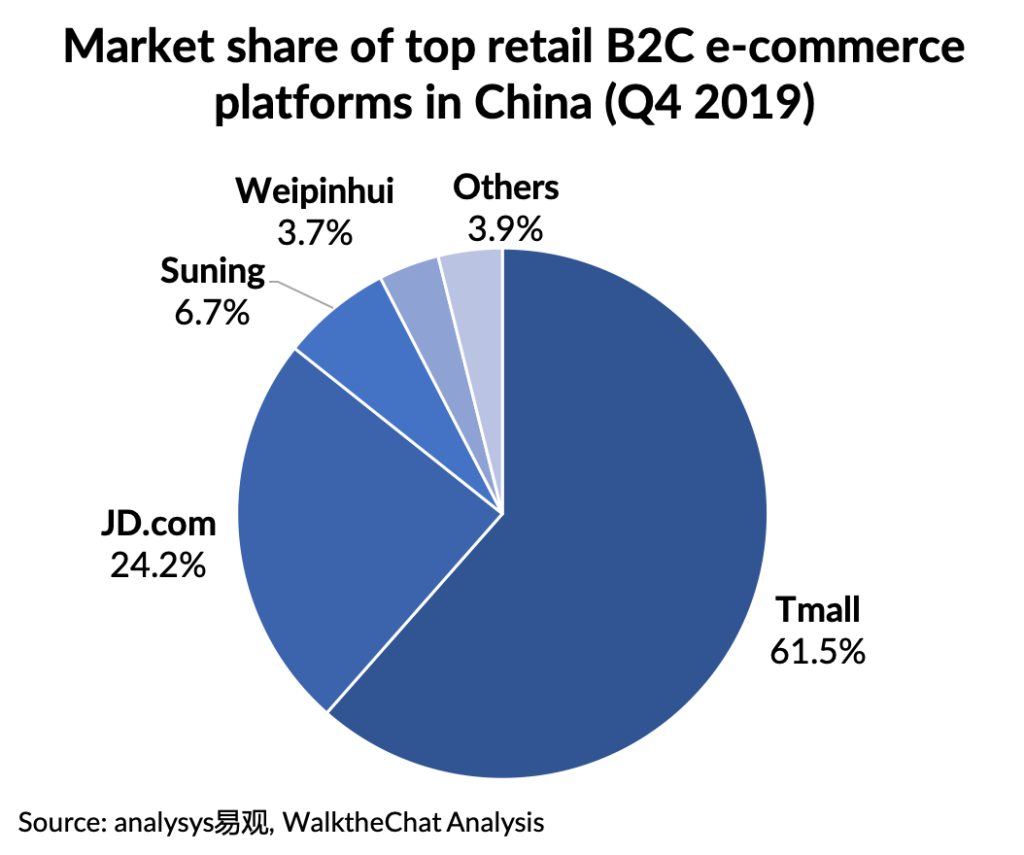
Some other platforms might however be relevant, depending on your category:
- JD.com: JD.com has a proprietary logistic system enabling same-day or next-day purchase, usually faster than Tmall. It is therefore often used by customers wanting to get products under short notice. JD.com is also stronger in large cities, and in the electronics category.
- Suning: Suning is very specialized in the customer electronics category. Smartphones and home electronics are the leading categories on the platform
- Weipinhui: Weipinhui is a marketplace focused on cosmetics and beauty
Most companies would use the same TP for both Tmall, JD and other platforms (JD.com uses the same acronym “TP”, meaning in this case “Technical Partner”).
Launching on multiple platforms will usually multiply the investment without necessarily multiplying sales (because of the dominant position of Tmall). Most brands would start with Tmall and then extend to other platforms such as JD.com once they succeeded in Alibaba’s ecosystem.
Beyond marketplaces: WeChat trade partners
What is WeChat?
With over 1.15 billion monthly active users (MAUs), WeChat is dominating the social media and messaging space in China.
WeChat is a combination of Facebook, Messenger, and Paypal. The App contains three main sections:
- WeChat chat interface: it was the first feature of WeChat, a chat interface similar to Facebook Messenger or Whatsapp
- WeChat moments: similar to the Facebook timeline, it is the place where users can post or access news from their friends
- WeChat wallet: it is the most innovative section of WeChat, which gives access to payment services, money transfers, planes and movie tickets bookings, and more.

The App has impressive engagement rates with users spending 82 minutes per day on average on WeChat.
WeChat stores are e-commerce experiences embedded within WeChat. A brand can make their products available through WeChat by creating a WeChat store.

What is a WeChat Trader Partner?
A WeChat Trade Partner can help you set-up your brand on WeChat and generate sales on the platform.
A WeChat Trade Partner usually covers the following scope of work:
- WeChat Official Account creation
- WeChat Mini Program store set-up
- WeChat store design
- Customer service
- Influencer campaigns
- CPC/CPM campaigns
- WeChat content creation
What is the cost of a WeChat trade partner?
Unlike Tmall Partners, most WeChat trade partners would charge fixed fees for operation.
Typical fees would include:
- Store set-up & design: $9,000 USD
- Customer service: $500 USD / month (depends on volume and service hours)
- WeChat Content: $1,000 to $5,000 USD / month (depends of amount of content & customization)
- WeChat seeding: $500 to $2,500 USD / month depending on the number of products gifted.
- WeChat influencer campaigns: successful brands would usually invest $5,000 USD / month
- Commission: ~2% commission paid to WeChat payment
Overall, the total investment for a WeChat launch can be as low as $100,000 USD for the first year of operation, 1/10th of the required amount for a Tmall launch.
How to pick a WeChat trade partner?
Identify brands WeChat Mini-program developers
Unlike Tmall, there is no official listing of partners from WeChat.
One simple way to identify relevant WeChat partners is to look for WeChat Mini Programs from brands you know are doing well in China.
You can do so by opening the Mini-program of the brand and clicking on the “More info” panel. Look into the “Service and data provided by:” section to find out who developed the Mini-program.

Identify brands with a lot of mentions on WeChat or Little Red Book
Brands who are using a high-performing WeChat Trade Partner should also have a lot of mentions on WeChat, Little Red Book, and Chinese other social networks.
You can use the search feature inside WeChat in order to check the number and frequency of mentions from each brand. You will have to scroll to the bottom of each article in order to see the view number for each article.

Ensure the specific scope of the WeChat trade partner
As for Tmall, be aware that brands might use different providers for different aspects of their WeChat operation (WeChat store, design, influencer campaigns, etc.) so be careful to ask each WeChat Trade Partner with their exact scope of work with each client.
Pick a partner with a strong integration capability
If you are using an existing e-commerce solution such as Shopify, try to select a WeChat trader partner with an integration with your current webstore.
E-commerce integration enables you to manage your WeChat store products, inventory and orders directly from Shopify.
In the case of Shopify, WalktheChat already developed a sales channel which is the first WeChat channel to be published on the platform’s App store:
https://apps.shopify.com/walkthechat-wechat-connector
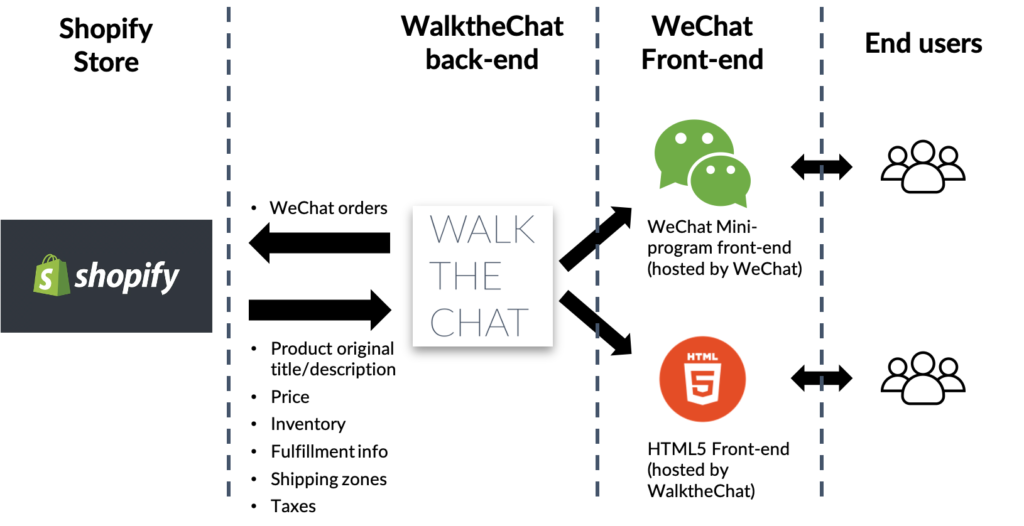
Look into Shopify experts
If you are a Shopify merchant, Shopify has put together a list of vetted providers who can help with various operations of Shopify operations, including WeChat operations.
WalktheChat is part of the WeChat experts certified by Shopify:
https://experts.shopify.com/walkthechat
Conclusion
Picking the right partner to launch on WeChat and Tmall is essential to your success in China.
A lot of data is available online to assess how brands managed by specific Tmall or WeChat partners are performing. By carefully reviewing this data, you can ensure picking a high-performing partner to launch your brand in Mainland China.

